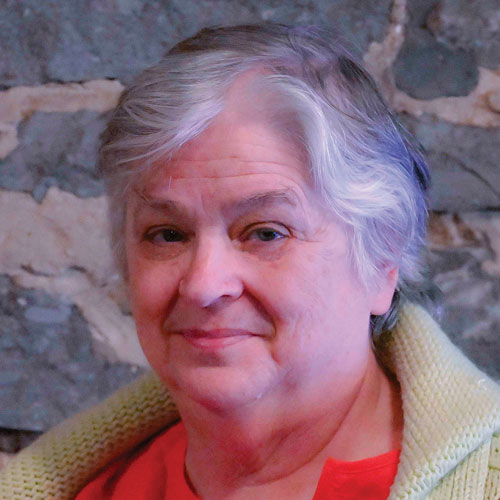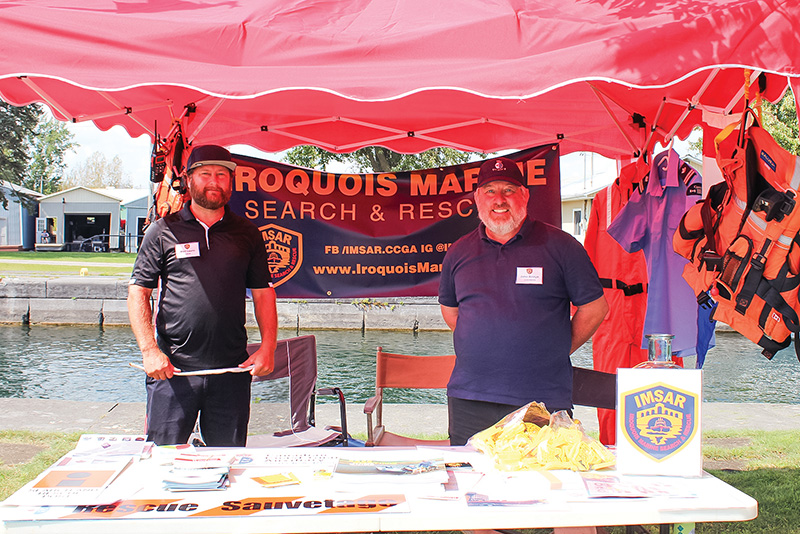From the left: Matt Laurin and John Bridges are shown at their booth during the “Float with us for Autism” event held earlier this summer. Bridges mentioned the organization plans to have a presence at the Apple Festival in Iroquois on Sept. 21. Thompson Goddard Photo
IROQUOIS – With many waterfront areas in South Stormont and South Dundas, ensuring the safety of people on the St. Lawrence has always been a top concern for residents and municipal council members. Safety on the water is a year-round concern as winter activities such as ice fishing or snowmobiling can lead to the need for a water-based rescue.
The Iroquois Marine Search and Rescue unit (IMSAR) Unit 564, composed entirely of volunteers, was recently formed and aids those in distress on the St. Lawrence River between Prescott and Long Sault. The area to the east of Long Sault is administered by the CCGA’s Quebec Region but IMSAR is available if the need should arise to respond as mutual aid can be provided outside of a Unit’s designated area.
IMSAR is a unit of the Canadian Coast Guard Auxiliary, which is a not-profit organization, dedicated to ensuring safety on the water as well as providing other services such as a 24-hour search and rescue service. Unit Leader Coxswain John Bridge explained in a recent interview, the Unit will operate in a manner like the first responders on land.
There are currently 15 active members in Unit 564, with training provided at both the Royal Canadian Legion Branch 370 in Iroquois and the Galop Canal Marina in the South Dundas community. Bridge mentioned there were various requirements for joining which include a pleasure craft operator card (PCOC), a Marine Radio Communications license as well as living within 30 minutes of the Unit’s boat which will be located at the Galop Canal Marina.
After joining the Unit, there is training provided at the Royal Canadian Legion Branch 370 in Iroquois which includes practical instruction including navigation, and personal safety. Members will cover basic first aid, which includes information on the treatment and care of weather-related health conditions such as heat stroke and hyperthermia. At the Galop Canal Marina, trainees will be instructed on skill development which includes Person in the water recovery, safe docking of boats, fire control, search patterns and different types of towing.
Bridge mentioned Phase One and Phase Two are equivalent to Transport Canada Certification, necessary to go onboard Coast Guard vessels, with the expectation this should be completed successfully within a year of joining. He mentioned a Canadian Coast Guard Auxiliary vessel will be supplied to the Unit, with a Rigid Hull Inflatable Boat (RHIB) arriving in a few weeks.
Boat safety begins with the boater themselves by ensuring they are compliant with the different regulations from Transport Canada, which are available online. It is very important for there to be some type of communication device in the vessel, such as a VHF radio or cell phone.
After mentioning the need for a communication device, it is not only for those boating, but also for people participating in paddleboard or kayaking, he described the process whereby a person in distress on the water can receive assistance. The first call would be to the Canadian Coast Guard in Prescott, via *16 on a cell phone or preferably CH16 on a vhf radio who would then contact the Joint Rescue Coordination Centre (JRCC) in Trenton. The JRCC who would then contact the appropriate unit to respond, which in South Dundas and South Stormont, would be the IMSAR Unit 564.
Once the IMSAR responders have been contacted by the Team Leader through a phone pager system and have reported for duty, they will travel to the scene by boat.
Once there they will assess the situation and formulate a plan based on the circumstances presented, either by members of the CCGA or if needed contacting land-based emergency medical services with the person transported to the shore and released into the care of the first responders.
Bridge stressed the importance of safety and with his fellow members of Unit 564 are dedicated to providing assistance to those who find themselves in an emergency situation in their area of responsibility.
More information on IMSAR and an online application form is available on Unit’s website at www.iroquoismarinesar.com.
If you would like to have a light shined on your business, please contact us at: editor@etceterapublications.ca or call us at 613-448-2321.

Carolyn Thompson Goddard, grew up in Chesterville and attended North Dundas District High School. After completing her BA in Political Science at Carleton University she has worked as a medical secretary and library technician. In 2020 she graduated from Algonquin College with a diploma in Journalism and has been a reporter and column writer for The Chesterville Record for over 10 years.









